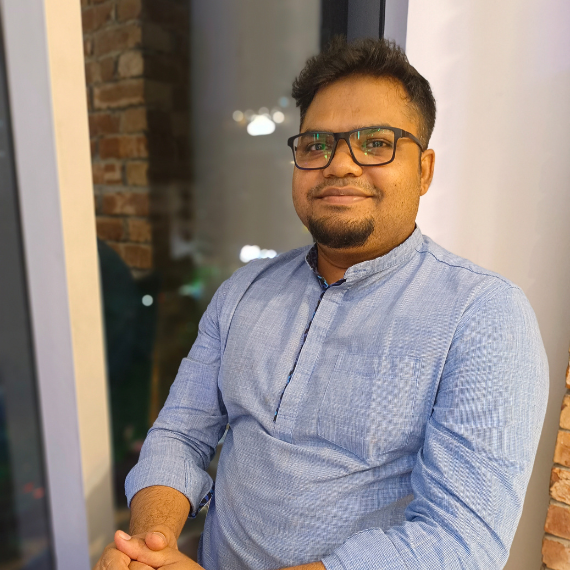M Manjurul Islam Spotlight: Investigating the Impact of Climate Change on Food Security

After working in the Bangladesh development sector for ten years, PhD student M Manjurul Islam is turning his focus to climate change adaptation. Through his research, Manjurul hopes to identify and develop sustainable practices that positively contribute to food security while mitigating the impacts of climate change.
In recognition of this valuable research, Manjurul has been awarded a 2023 Arrell Scholarship.
Manjurul shared with us his passion for supporting the resilience of coastal communities as they adapt to the impacts of climate change in his home country of Bangladesh and globally.
What is your program and area of research?
I will be pursuing a PhD in Geography and researching climate-smart food systems.
How would you explain your discipline and/or research to someone who wasn’t in your program?
My research interest lies in the intersection of climate change and food security, specifically the impact of climate change on food security in coastal areas.
I am interested in exploring how rising sea levels, increased temperatures, and more frequent natural disasters affect food production and access to food in these regions. I believe that by investigating the impact of climate change on food security in coastal areas, I can contribute to developing effective adaptation strategies that will improve the resilience of communities and reduce the risks associated with food insecurity. I am eager to contribute to the body of knowledge on climate change and food security.
What do you wish your colleagues/friends/family knew about your work?
Despite the seriousness of this problem, research on the sustainability and effect of climate-smart food systems in coastal Bangladesh is lacking. The usefulness of various climate-smart measures, such as crop diversification, water management, and conservation agriculture, in strengthening resilience and supporting sustainable agriculture and livelihoods in this area must be investigated.
Why is your research important to you?
Climate-Smart Food Systems research helps identify and develop sustainable practices that reduce the environmental impact of food production. By promoting climate-smart agriculture techniques such as agroforestry, precision farming, and sustainable irrigation methods, we can mitigate greenhouse gas emissions, protect ecosystems, and preserve natural resources.
Climate-Smart Food Systems research aims to enhance agricultural productivity and efficiency while minimizing environmental impacts. This helps increase food production and availability, ensuring that nutritious and affordable food reaches vulnerable populations.
What do you consider your biggest challenge?
One of the biggest challenges in Climate-Smart Food Systems research is the complex and interconnected nature of the food system itself. Climate change affects various components of the food system, including production, processing, distribution, and consumption. Addressing the climate impact of the entire food system requires a holistic approach and collaboration across multiple sectors.
What are you most proud of?
I am proud of my profession. I have more than 10 years of professional experience in development sector in Bangladesh. I support many disadvantaged people and the community thought my skills and expertise, which I believe has created positive impacts by enhancing the resilience of poor communities.
What drives you?
I would say as a development practitioner, I always need to work with vulnerable people and those struggling with poverty. Their happiness gives me motivation to do better and drives me to support them to change their life positive way.
What do you plan to do with your degree/following this initiative?
After finishing my PhD., I want to return to Bangladesh and work as a researcher at a university or policy institution where I can continue to train future generations of young researchers on climate change adaptation and sustainability. Moreover, I want to conduct sustainable policy research to support my country in becoming more resilient to food security.
Is there a fun or interesting fact about yourself that you’d like to share?
I am food lover! I enjoy exploring new places and tasting popular local foods and dishes. I also love to cook. I learnt how to cook from my mother, and I believe I can cook better now because people often say my food is delicious.